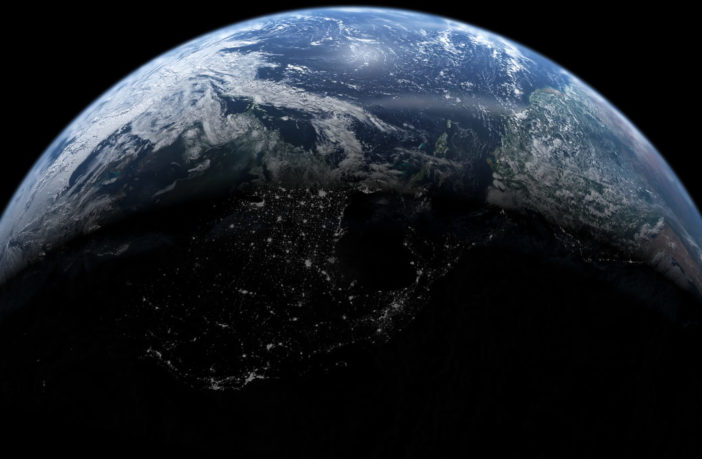PV Magazine
In the first in a series of interviews on the topic of renewable energy and geopolitics, Indra Overland, head of the Center for Energy Research (NUPI) and Member of the Research Panel, Global Commission on the Geopolitics of the Energy Transition at IRENA, discusses the effects a greater penetration of solar, and other renewable energies, in the global energy mix, could have on world order.
Although fossil fuels will continue to play a dominant role in the coming years, sooner or later the geopolitics of energy will cease to be that of gas and oil, according to Overland. Although it is still difficult to predict future scenarios, he believes renewables have the potential to make nations more energy independent, and provide the basis for more peace and stability.
“Even small changes in the global energy mix could have significant geopolitical consequences.” This is one of the main assumptions of research conducted by Indra Overland, head of the Center for Energy Research (NUPI) and Member of the Research Panel, Global Commission on the Geopolitics of the Energy Transition at the International Renewable Energy Agency (IRENA).
In the first of a series of interviews on the topic geopolitics and renewable energies, Overland discusses with pv magazine the changes renewables are bringing, and will continue to bring, to world order.
“We haven’t seen too many changes so far, but there are already some visible signs that things are changing at the geopolitical level,” Overland said. According to him, if we look at what happened in Syria and Iraq over the past decade, although military thinking is still in the old track, there is less of a preoccupation with oil.
“The U.S. and other powers acting in both countries are more interested in stabilizing the region, rather than seeking their oil reserves,” Overland said. He is also convinced, however, that it is still premature to say that a real revolution is happening right now. Renewable energy use, in fact, will not be able to surpass consumption of fossil fuels in the next several decades. “But one thing is certain, the geopolitics of energy will sooner or later cease to be that of gas and oil,” he said.
Indra Overland
Image: Norsk Utenrikspolitisk Institutt (NUPI)
More visible changes will be seen as we approach peak oil demand, which is now expected to happen sometime between 2025 and 2030. “Whenever this peak is reached, and oil demand starts declining in earnest, solar and wind will grow further, with a big impact on the world’s energy economy,” he said.
“Maybe the first substantial and big changes produced by renewables could appear a bit later, possibly in 2035, though they could also happen earlier.”
When asked which world regions are showing, or will show, the first signs of these changes, he pointed to oil rich countries and regions that still depend heavily on fossil fuel production.
“Saudi Arabia, the UAE and other Gulf countries, for example, have already started trying to diversify their economies, which have so far been entirely dominated by oil exports. They have launched ambitious plans for solar power, but this, despite their huge potential in terms of sun and clean energy, may not be enough, as it doesn’t solve the main challenge of replacing oil exports as the biggest source of national income,” Overland said.
He continued, “Russia, may be less affected than the Gulf states, as its economy relies also on other large sources of income coming from agriculture, mining and potentially high-tech industries.”
Other major petrostates, such as Angola, Nigeria and Venezuela, seem less prepared and able to diversify their economies, and may consequently have a bleak outlook.
Overland also believes, however, that the Middle East and particularly North Africa may be the future scene for projects similar to the well-known Desertec project, which was conceived to deploy large volumes of CSP and PV capacity in the Sahara Desert to generate electricity for export to South European countries.
This project was abandoned at the beginning of the decade for several reasons, including the difficulties of reducing the costs of CSP technology – which at the time was considered more suitable for the high temperatures of the desert – and the Arab Spring, which brought instability to the entire MENA region.
“Plans for projects, such as Desertec, may easily emerge again in a few years, and climate policy may be a powerful driver for this,” Overland said, adding, “North African countries such as Algeria, for example, have vast areas suitable for solar power infrastructure that Europe may need access to in the future.”
In general, according to Overland, we will see an increasing number of countries becoming energy exporters in the future, as the number of so-called “prosumer states” is expected to rise.
“The costs of renewable energy are falling precipitously. If we add to this the possibility of more aggressive climate policies in the future, the result is a scenario more favorable to a decentralized global energy system, which may in turn result in a planet with less international conflict,” he said.
He further explained, however, that his point of view cuts across the so-called “liberal” and “realist” approaches to international relations. According to the liberal approach, more trade and interaction among states leads to less conflict among them. The “realistic approach,” instead, sees nation-states as inherently competitive and as tending to act only in defense of their own interests.
While agreeing with the liberalists that international trade is generally good for peace, Overland believes that this does not apply to oil. The reduction of international oil trade through greater energy self-sufficiently should therefore be good for peace and stability.
“There is little risk, for example, that solar energy may become a quasi-oligopoly of some countries as the case is with oil and gas,” he went on to say. According to him, although China is currently hosting most of the world’s manufacturing capacity, countries such as the United States, Japan or Germany, could potentially re-establish solar panel manufacturing capacities in a relatively short period of time, if needed.
“Most PV modules are being produced in China, because it is currently the cheapest place to produce them, but that may change,” he said. A parallel, according to him, can be drawn to the production of smart phones. “The Western world is letting China produce the products it needs, because it does so cheaply,” he contined.
When asked if the ongoing trade disputes regarding PV components between China, the U.S. and the EU already reflect geopolitical interests or issues, Overland said that so far, it is just part of the more general commercial trade conflicts between these big economic powers, and that no real geopolitical concern is linked to the global PV industry at the moment.
“In his aggressive approach to China, President Donald Trump has made it clear that the U.S. wants an equal trade relationship with China, and this, of course, has serious implications for the Chinese economy and eventually for its strong industries,” he said.
In one of his upcoming papers, on four geopolitical myths about renewable energy, Overland shows what are considered to be the most important consequences of renewables for international affairs and security: increased competition over critical materials; the emergence of new forms of the resource curse; use of electricity disruption as a geopolitical weapon; and the rise of cybersecurity as geopolitical risk.
“In my article, I point out the risk of transposing patterns of behavior from an energy system dominated by oil and gas onto a future system in which renewables are prevailing,” Overland said. “But renewables will almost certainly be more geographically evenly distributed than are fossil or nuclear fuels,” he added.
As a result, there will likely be less reason for great powers to compete for valuable locations, and the risks coming from transport bottlenecks should also be minimized.
Competition related to renewable energies among nations, however, may possibly arise from the supply of critical materials for the production of the required hardware. “It is still difficult to predict which material will become critical, if any. It depends on how the technologies evolve,” Overland concluded.








